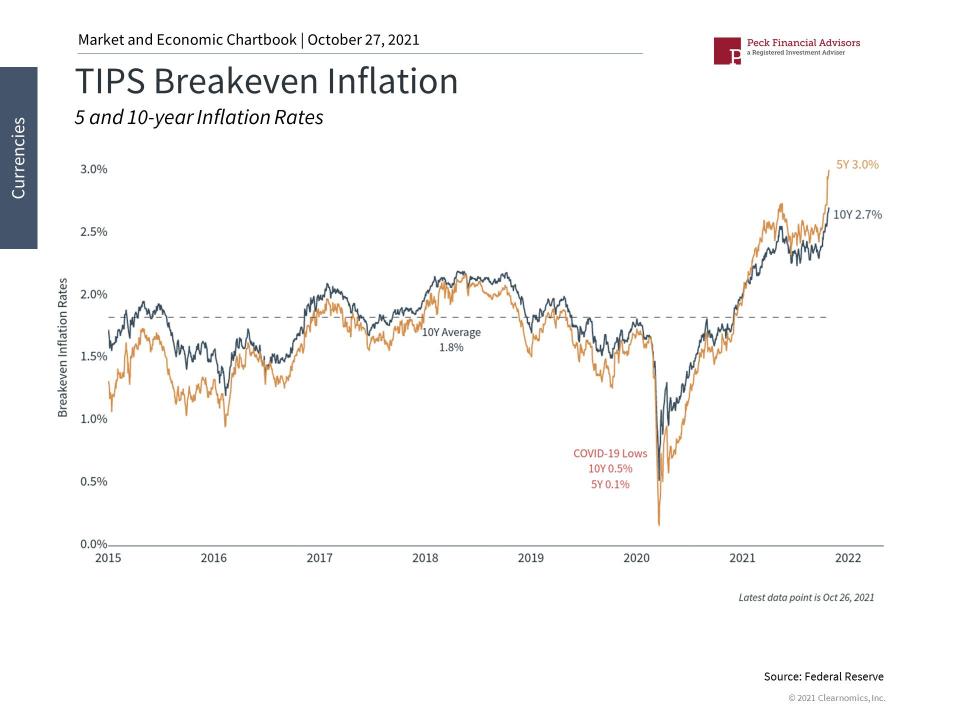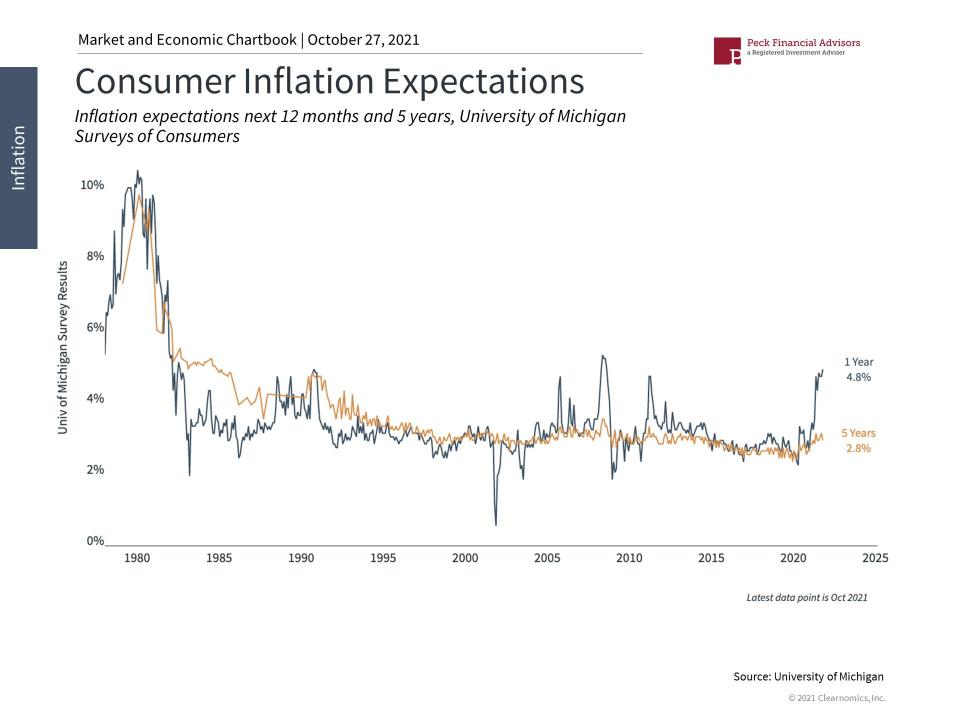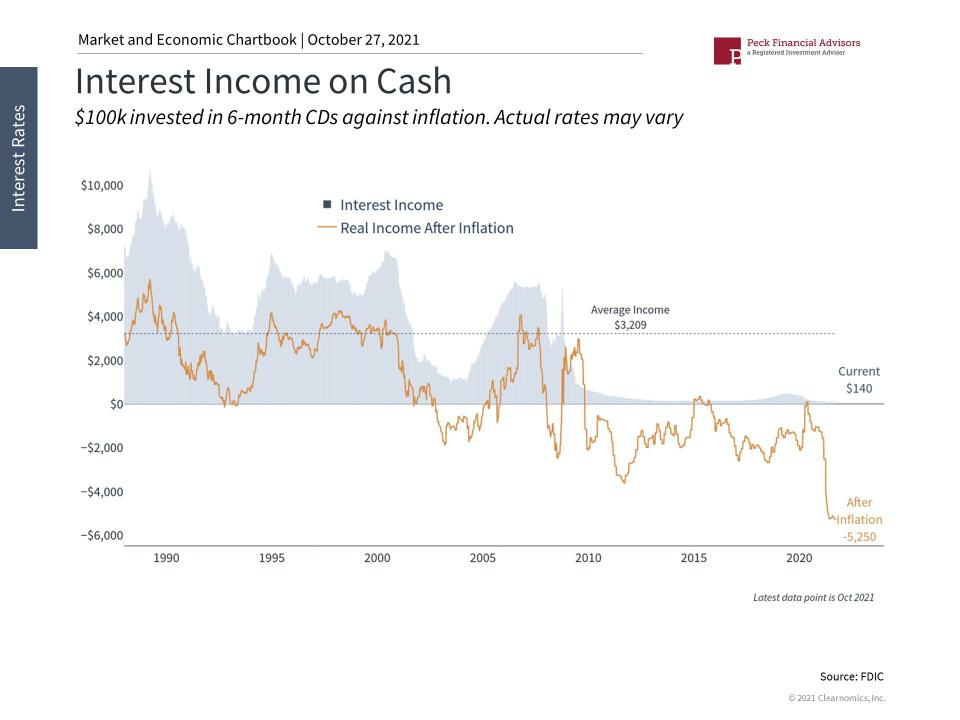|
Inflation continues to be a hot topic for investors as markets adapt to worsening supply chain disruptions. However, not all inflation is the same and today's environment requires a clear understanding of what's driving prices higher. More importantly, this can affect portfolios and financial plans in different ways. How should investors react to today's inflation rates with the right perspective?
All investors understand that the prices of individual goods and services can be affected by supply and demand. Common sense tells us that when supply falls and/or demand rises in a competitive market, prices will tend to rise. This is true whether we're talking about used cars, lumber, houses, computers, sneakers or concert tickets. Business owners are faced with balancing these factors every day.
In cases where supply is artificially disrupted, there can be a "deadweight loss" to society since there are willing buyers who miss out - not just because prices are temporarily high, but because there may simply not be enough goods available. Recent examples are toilet paper and hand sanitizer at the start of the pandemic when a surge in demand caused widespread shortages. Governments and businesses can try to control prices or impose quotas but this doesn't solve the underlying problem and can create its own imbalances.
While challenging, few economists would describe the situations above as "inflationary." Instead, the term inflation usually refers to a broad-based increase in prices across an economy. Historically, these price increases are attributed to factors that can affect the macro-economy, like monetary policy or an overheating growth rate.
This is what makes today's situation unique. Prices are rising across the board not necessarily because of the Fed, but because bottlenecks in today's global world affect nearly all industries. This is akin to the supply curves of these industries all being impacted at once and is not dissimilar to the oil crisis of the 1970s. Just as there is no way to avoid higher energy costs, there is no way to avoid long delays for the materials and supplies that businesses and consumers need. This reduces availability and raises costs.
Thus, when investors talk about "inflation" today, what they really mean is "supply chain disruptions." Similarly, when investors debate whether higher inflation is "transitory" or not, they are really debating whether they are due to short- and medium-term supply problems or longer-term factors such as Fed policy.
How this is resolved requires a combination of macro forces related to global energy and port capacity, and micro forces on an industry-by-industry basis. Still, the longer this goes on, the more it will affect inflation expectations among businesses, consumers and financial markets. Both TIPS breakeven inflation rates and inflation expectations from the University of Michigan's Surveys of Consumers are near multi-decade highs. Other measures, such as CPI, PCE and PPI, are also near record levels. Only time will tell if they begin to fall once the year-on-year comparisons to the pandemic fade.
For savers, inflation slowly erodes the value of hard-earned cash. If your daily purchases cost more, it doesn't really matter if it's due to factory shutdowns in Asia or the size of the Fed's balance sheet - the effect on a household's bottom line is the same. Unlike traditional gains and losses which are explicit on a monthly statement, the balance in one's checking account may stay the same. However, the amount of goods and services that can be purchased with that cash will fall silently over time.
For investors, different causes of inflation can have a big impact on portfolio strategy. Slow and steady inflation lends itself to assets that match this time horizon, possibly including TIPS, real assets and more. Sudden spikes in prices due to supply constraints may lend themselves more to sector and industry tilts. Over time, the differences between these two causes may be blurred - but long-term expectations have yet to rise to the same extent.
Ultimately, it's important for investors to maintain perspective on today's price increases. Inflation is a reason to stay invested to offset the negative impact to purchasing power. Below are three insights that can help investors navigate today's inflation rates.
1. The market is adapting to higher near-term inflation
TIPS Breakeven Inflation

The market has been adapting to stubborn levels of inflation. Even if inflation is "transitory," the longer they last, the less investors can ignore their effects. TIPS prices now reflect higher inflation rates over the medium-term before falling in the long run.
2. Consumers expect higher prices too
Consumer Inflation Expectations

Consumers are feeling the pinch of supply disruptions as price increases affect a variety of daily goods and services. This survey of expectations suggests that consumers believe prices will remain high before coming back down in the medium-term.
3. Inflation quietly erodes the value of cash
Interest Income on Cash

Over time, inflation quietly erodes the value of cash. The average savings account at today's interest rates is effectively losing thousands of dollars per year due to higher inflation.
The bottom line? Investors should stay diversified in order to offset the effects of inflation in their portfolios.
|




